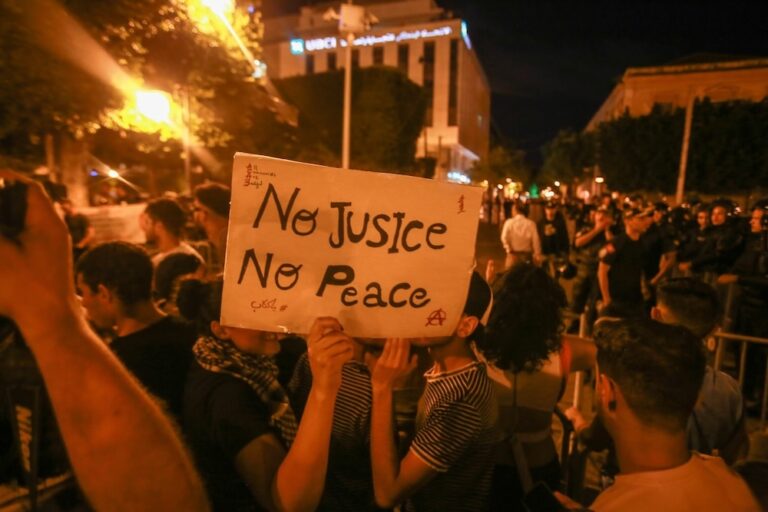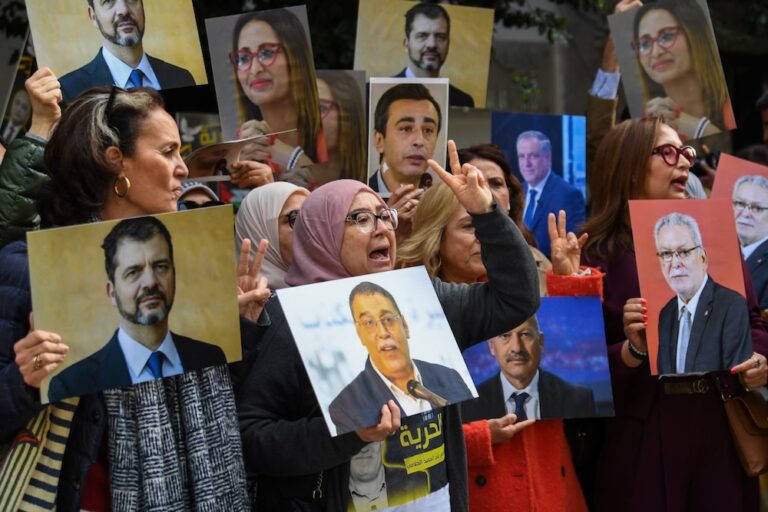(IFEX-TMG) – On 13 May 2009, the IFEX-TMG wrote to Tunisian President Zine el Abidine Ben Ali urging him to end his government’s interference in the work of the national journalists’ union, the SNJT. His Excellency Zine el Abidine Ben Ali President of Tunisia Presidential Palace Carthage, Tunisia Fax: + 216 71 744 721 13 […]
(IFEX-TMG) – On 13 May 2009, the IFEX-TMG wrote to Tunisian President Zine el Abidine Ben Ali urging him to end his government’s interference in the work of the national journalists’ union, the SNJT.
His Excellency Zine el Abidine Ben Ali
President of Tunisia
Presidential Palace
Carthage, Tunisia
Fax: + 216 71 744 721
13 May 2009
Your Excellency,
We, the undersigned members of the Tunisia Monitoring Group (TMG), a coalition of 18 member organisations of the International Freedom of Expression Exchange (IFEX) network, are writing to express our serious concern at your government’s efforts to undermine the independence of the Syndicat National des Journalists Tunisiens (SNJT) and interfere in its work.
Following the publication of a SNJT report criticising the lack of press freedom in Tunisia on 4 May, a government-backed campaign was launched to remove the leadership of the new union and produce a press freedom report that is more supportive of the regime. Pro-government journalists circulated a petition calling for the replacement of the union’s leadership and journalists have reportedly been threatened with dismissal should they refuse to sign. Under pressure, three Board members resigned – four resignations would trigger elections – although their resignations have been rejected by the Board.
In addition, SNJT President Neji Bghouri has been under attack since the day he released the report – facing both physical and verbal aggression that day, with continued verbal assaults until now.
We are seriously concerned that the government is attempting to undermine the solidarity of journalists and to engineer the political compliance of the SNJT as part of its campaign to undermine freedom of expression in Tunisia.
We respectfully remind you that the state must not interfere in the operations of the SNJT, which should be allowed to operate as an independent journalists’ union, free from political interference and free to report independently. We note that the government used similar tactics to dissolve the executive board of the Association of Tunisian Judges (TAM), and tried but failed to do so with the Tunisian League for Human Rights (LTDH).
We respectfully call on you to ensure that the government immediately stops interfering in the affairs of the SNJT and permits it to report and manage its affairs free from state influence.
We look forward to hearing from you at your earliest convenience.
Yours sincerely,
Arabic Network for Human Rights Information (ANHRI), Egypt
ARTICLE 19, United Kingdom
Canadian Journalists for Free Expression (CJFE), Canada
Cartoonists Rights Network International (CRNI), United States
Egyptian Organization for Human Rights (EOHR), Egypt
Index on Censorship, United Kingdom
International Federation of Journalists (IFJ), Belgium
International Federation of Library Associations and Institutions (IFLA), Netherlands
International Press Institute (IPI), Austria
International Publishers’ Association (IPA), Switzerland
Journaliste en danger (JED), Democratic Republic of Congo
Maharat Foundation, Lebanon
Media Institute of Southern Africa (MISA), Namibia
Norwegian PEN, Norway
World Association of Community Radio Broadcasters (AMARC), Canada
World Association of Newspapers (WAN), France
World Press Freedom Committee (WPFC), United States
Writers in Prison Committee of International PEN (WiPC), United Kingdom


